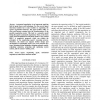Free Online Productivity Tools
i2Speak
i2Symbol
i2OCR
iTex2Img
iWeb2Print
iWeb2Shot
i2Type
iPdf2Split
iPdf2Merge
i2Bopomofo
i2Arabic
i2Style
i2Image
i2PDF
iLatex2Rtf
Sci2ools
132
click to vote
JSW
2008
2008
Reasoning Principles for Negotiating Agent
Automated negotiation is an important applying field of agent theory and technology. For the current agent theoretical models have some troubles in explaining the agent's negotiation behaviors, this paper defines utility as costs and incomes coming from the transformation of the possible negotiation states. This lead to a semantic model fitting the agent's automated negotiation. Then, on the basis of the classical Belief-Desire-Intention model, a logic named BDI-U is completely proposed, which can explain the principles of the negotiating agent's reasoning process. Therefore, the model can support further design and development of negotiating agent. The work performs five steps: designing formal language, designing semantic model, explaining semantics, proposing and explaining system axioms, and the axioms' validity proof.
Related Content
| Added | 13 Dec 2010 |
| Updated | 13 Dec 2010 |
| Type | Journal |
| Year | 2008 |
| Where | JSW |
| Authors | Mukun Cao, Yuqiang Feng |
Comments (0)

